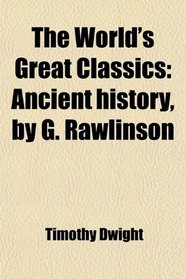Search -
The World's Great Classics: Ancient history, by G. Rawlinson
The World's Great Classics Ancient history by G Rawlinson
Author:
Purchase of this book includes free trial access to www.million-books.com where you can read more than a million books for free. This is an OCR edition with typos. Excerpt from book: including the rich plain of Cutchi Gandava on the west bank of the river, and the broad delta of the Indus towards the south. Chief town of the upper region, Tax... more »
Author:
Purchase of this book includes free trial access to www.million-books.com where you can read more than a million books for free. This is an OCR edition with typos. Excerpt from book: including the rich plain of Cutchi Gandava on the west bank of the river, and the broad delta of the Indus towards the south. Chief town of the upper region, Tax... more »
ISBN-13: 9781458911285
ISBN-10: 1458911284
Publication Date: 8/3/2009
Pages: 234
Rating: ?
ISBN-10: 1458911284
Publication Date: 8/3/2009
Pages: 234
Rating: ?
0 stars, based on 0 rating




